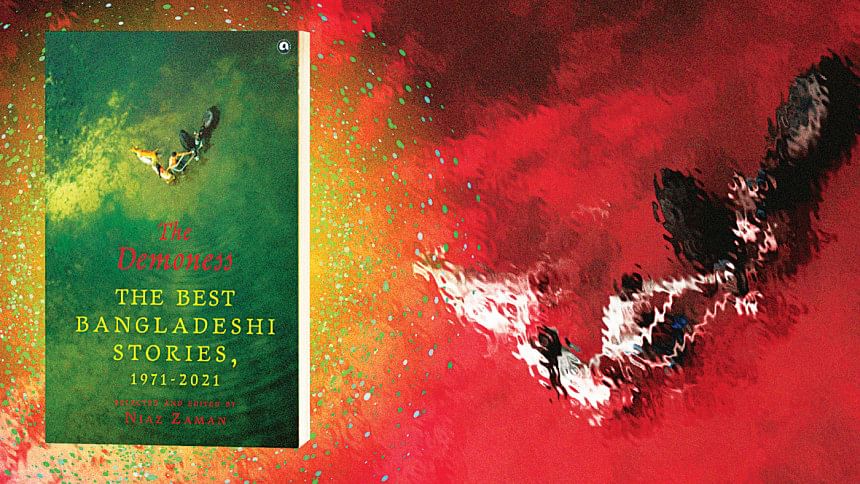Creating an appetite for Bangladeshi fiction

A good story is hard to find. Niaz Zaman, the editor of The Demoness: The Best Bangladeshi Short Stories, 1971-2021 (Aleph Book Company, 2021), has found 27 "best" short stories to create an appetite for Bangladeshi fiction. Zaman has made sure that these stories do not lose the flavour of the original, and in the golden jubilee of this nation, the platter she has arranged can easily be devoured in one sitting—such is the pace of the prose.
Bangladeshi writings often fail to get the attention they deserve in the absence of either decent translation or strategic marketing positioning. The hegemonic role of Bangla literature coming out of the other side of the border coupled with the wilful ignorance of our own literature has deprived local creative works of their expected niche. The Demoness is, therefore, a timely utterance. At a time when the world is taking note of the magical goodies coming out of a country that was once written-off by political pundits as a "bottomless basket", the anthology showcases some of the great cultural ambassadors of Bangladesh.
The title, which is also the title of the first story included in the anthology, however, does not do justice to the collection. While it perhaps subsumes the editor's personal preferences for Kazi Nazrul Islam, the national poet, it does not indicate why the interior monologue of a woman who has murdered her husband to prevent him from marrying for the second time should be the overarching theme of a book that is celebrating the best authors of a proud nation.
Similarly, the inclusion of writers such as Kazi Nazrul Islam and Syed Mujtaba Ali is sure to raise some brows, as the temporal bracket in the title limits the anthology to only 50 years for the collected short stories. But the editor, in her elaborate introduction, offers a broad definition of "Bangladeshi". She posits, "'Bangladeshi Stories' [...] refer to Bengali short stories written by persons associated with the land that gained its independence from Pakistan in 1971 and came to be known as Bangladesh. They are not all contemporary stories written post-1971, but predate the creation of Bangladesh".
Zaman is also conscious of reducing the gender gap, which is prevalent in any regular anthology. There are 11 female authors against 16 male authors to reassert the strong contributions women writers have made in the Bangladeshi canon formation. Most of these female writers are critical of the patriarchal violence and male gaze in which they must operate. Nasreen Jahan's story is a case in point, where religious conversion is tinged with fanatic frenzy that leads to a murderous rampage. Authors such as Jharna Das Purkayastha, Selina Hossain, Purabi Basu, and Shaheen Akhtar, according to Zaman, carry on the feminist spirit of Rokeya Sakhawat Hossain who could not be included for "technical" reasons (Rokeya wrote her best short story in English).
The experimental vein of contemporary Bangladeshi writing is evident in the works of Shahaduzzaman, Zakir Talukdar, and Mashiul Alam among others. "The Meat Market", translated by Shabnam Nadiya, involves a macabre murder that will send a cold chill down anyone's spine. You will never eat your meat in quite the same way again, to say the least. Another highlight, Syed Manzoorul Islam's "Daedalus's Kite" is surreal, entertaining, and poignant in its depiction of Old Dhaka.
Quite a few stories involve religious hypocrisy. Shaukat Osman's "Father Johannes", set in Chota Nagpur during the Second World War, exposes the greed of a Christian missionary who came to India to preach among the tribal population. Ahmed Mostafa Kamal's "Waiting", too, takes up the theme of colonisation where the protagonist reflects on his dervish ancestors who managed to set up a landed aristocracy while preaching Islam. The mighty River Padma devours the heritage to have the final say in a battle between imported spirituality and rooted resistance in nature.
Any history of Bangladesh will remain incomplete without the story of its Liberation War. Zaman includes stories by Hasan Azizul Huq, Rizia Rahman, Akhtaruzzaman Elias, Humayun Ahmed, and Jharna Rahman to make sure that we get a glimpse of the horrors that were entwined with the birth-pangs of the nation. Tales of heroism and cowardice, betrayal and bravery, violence and love come together to remind us of the trials and traumas behind the birth of the nation that this anthology is celebrating.
Etymologically, the word "anthology" means a gathering of flowers. Niaz Zaman has assorted some of the best writings coming out of Bangladesh to offer a bouquet to the world. This is a highly readable book that has the potential to grow into a series.
Shamsad Mortuza is Acting Vice Chancellor at the University of Liberal Arts Bangladesh (ULAB), and a professor of English at Dhaka University (on leave).

 For all latest news, follow The Daily Star's Google News channel.
For all latest news, follow The Daily Star's Google News channel. 



Comments